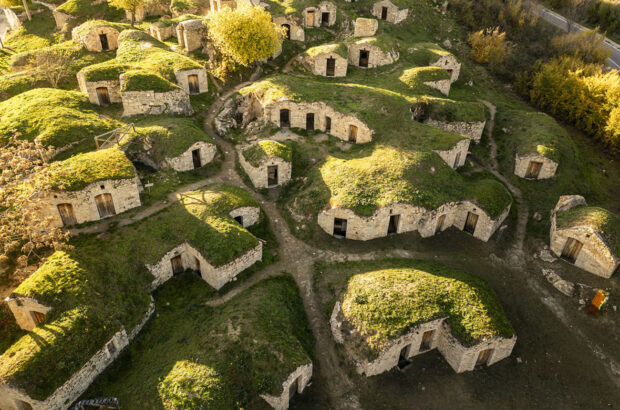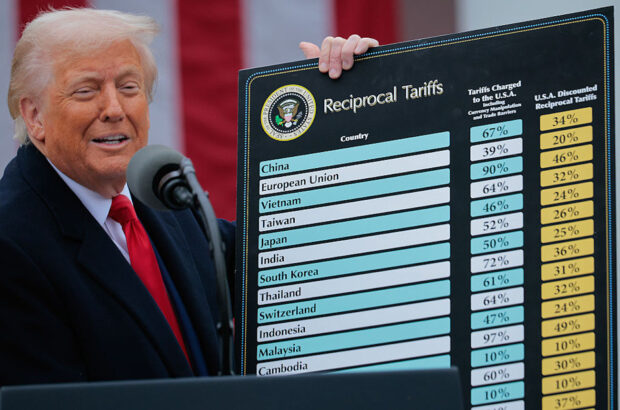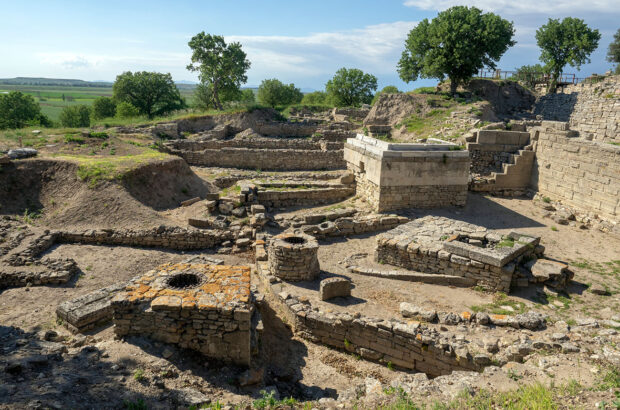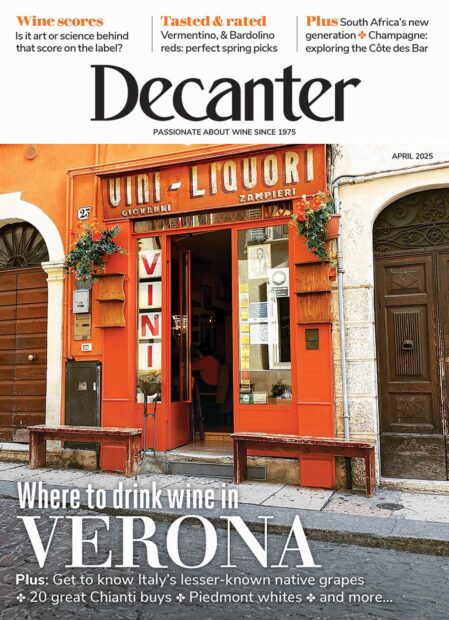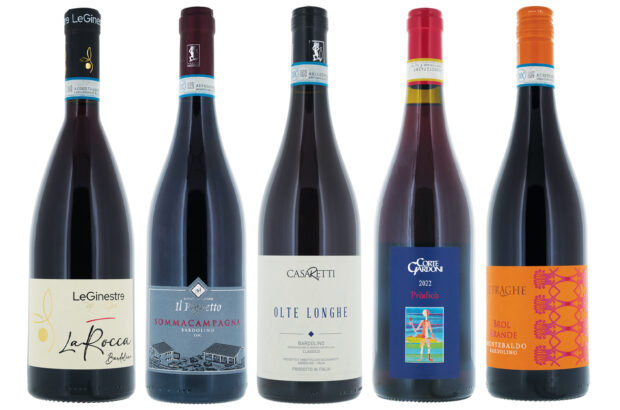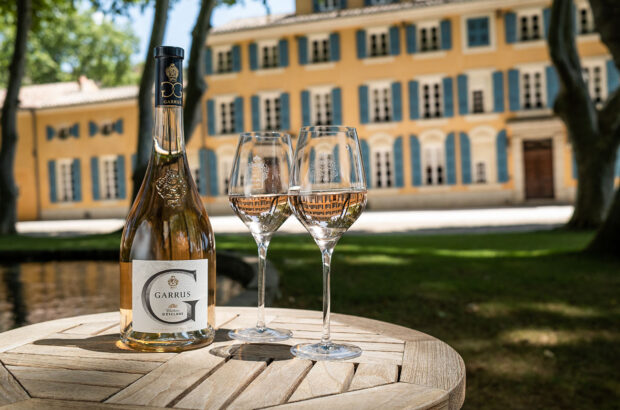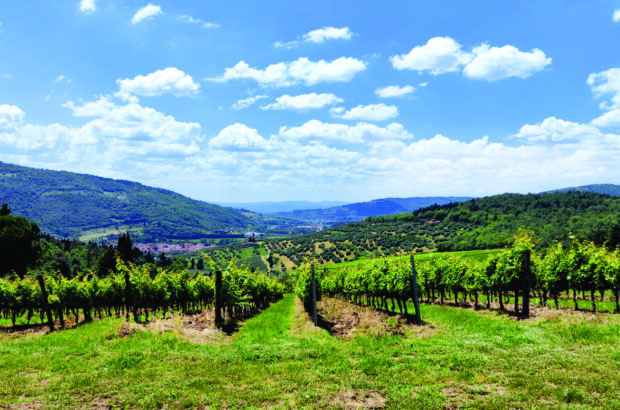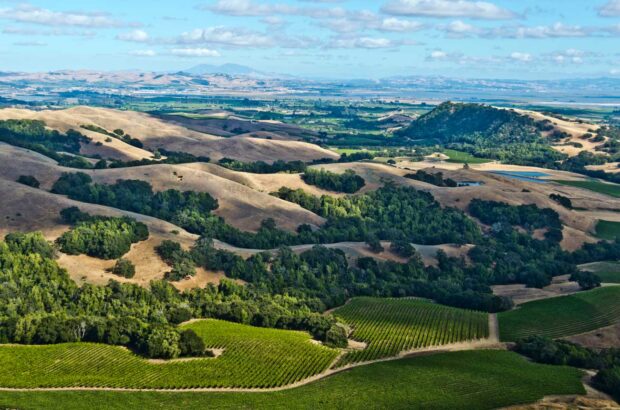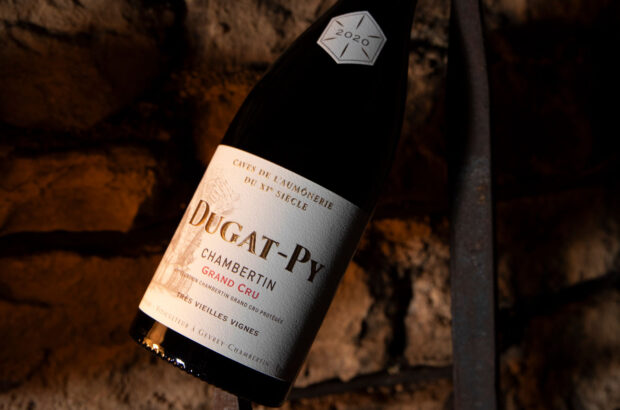Ever since St-Émilion turned away from the so-called ‘Parkerised’ style of viticulture and winemaking, the region has become a prime hunting ground for drinkers seeking a delicious Bordeaux bargain.
Scores of superb Grands Crus Classés ranging in price between £30 to about £45 a bottle offer excellent value for money.
Rather than being oaky, over-ripe and over extracted, most of the 71 Grands Crus Classés today reflect freshness, wet stone minerality and brighter ripeness from quality limestone and clay soils.
But one of the top St-Émilion Grands Crus Classés – Château Laroque – had never been a ‘Parker Darling’.
Scroll down for a mini-vertical of Château Laroque
{"content":"PHA+TGVzcyB0aGFuIGEgZGVjYWRlIGFnbywgaXQgZmxldyB1bmRlciB0aGUgcmFkYXIsIHdpdGggYSBjbGFzc2ljYWwgc3R5bGUgb2Ygd2luZW1ha2luZyB0aGF0IHdhcyBzb21ldGltZXMgcnVzdGljLCBidXQgbmV2ZXIgb3ZlcmRvbmUgb3IgYmlnLjwvcD4KPHA+PGRpdiBjbGFzcz0iYWQtY29udGFpbmVyIGFkLWNvbnRhaW5lci0tbW9iaWxlIj48ZGl2IGlkPSJwb3N0LWlubGluZS0yIiBjbGFzcz0iaXBjLWFkdmVydCI+PC9kaXY+PC9kaXY+PC9wPgo8cD5Gcm9tIDE5ODIgdG8gMjAxNCwgZXN0YXRlIGRpcmVjdG9yIEJydW5vIFNhaW5zb24gY3JhZnRlZCByZWZpbmVkIHdpbmVzIHRoYXQgcmVmbGVjdGVkIHRoZSBpbXByZXNzaXZlIHRlcnJvaXIgb2YgU3Qtw4ltaWxpb27igJlzIGxhcmdlc3QgY2jDonRlYXUuPC9wPgo8cD5UaGFua3MgdG8gaGlzIGd1aWRhbmNlLCBDaMOidGVhdSBMYXJvcXVlIOKAkyB3aGljaCBoYWQgYmVlbiBmYW1vdXMgaW4gdGhlIDE5dGggY2VudHVyeSDigJMgcmUtZW1lcmdlZCB0byB0aGUgcmFuayBvZiBHcmFuZCBDcnUgQ2xhc3PDqSBpbiAxOTk2LjwvcD4KPGgyPlJlYXBpbmcgdGhlIHJld2FyZHM8L2gyPgo8cD5DaMOidGVhdSBMYXJvcXVlIGhhcyBnYWluZWQgaW5jcmVhc2VkIHJlY29nbml0aW9uIGluIHJlY2VudCB5ZWFycywgd2l0aCBjcml0aWNzIHdvcmxkd2lkZSBoZWFwaW5nIGp1c3RpZmllZCBwcmFpc2UgdXBvbiBpdC48L3A+CjxkaXYgY2xhc3M9ImFkLWNvbnRhaW5lciBhZC1jb250YWluZXItLW1vYmlsZSI+PGRpdiBpZD0icG9zdC1pbmxpbmUtMyIgY2xhc3M9ImlwYy1hZHZlcnQiPjwvZGl2PjwvZGl2Pgo8cD5BcyB0aGUgdGFzdGUgZm9yIGV4dHJhY3RlZCwgb3ZlcnJpcGUgc3R5bGVzIGhhcyByZWNlZGVkLCBkZW1hbmQgZm9yIHdpbmVzIGxpa2UgQ2jDonRlYXUgTGFyb3F1ZSBoYXZlIHJpc2VuLjwvcD4KPHA+U2Vjb25kbHksIHJhdGhlciB0aGFuIGRvdWJsaW5nIGRvd24gb24gdGhlIGNsYXNzaWNpc20sIGluIDIwMTUgdGhlIG93bmVycyDigJMgdGhlIEJlYXVtYXJ0aW4gZmFtaWx5IOKAkyBoaXJlZCBlbm9sb2dpc3QgRGF2aWQgU3VpcmUgdG8gYWRkIHByZWNpc2lvbiBhbmQgc21vb3RoZXIgdGFubmlucyB0byBhbiBleGlzdGluZyBjbGFzc2ljYWwgc3R5bGUsIGVsZXZhdGluZyBxdWFsaXR5LjwvcD4KPGRpdiBjbGFzcz0iYWQtY29udGFpbmVyIGFkLWNvbnRhaW5lci0tbW9iaWxlIj48ZGl2IGlkPSJwb3N0LWlubGluZS00IiBjbGFzcz0iaXBjLWFkdmVydCI+PC9kaXY+PC9kaXY+CjxwPkluIGhpcyBmaXJzdCB5ZWFyLCBTdWlyZSB3b3JrZWQgd2l0aCBTYWluc29uIHRvIHVuZGVyc3RhbmQgdGhlIGVzdGF0ZSwgd2hpbGUgY29udHJpYnV0aW5nIGhpcyB2YWx1YWJsZSBleHBlcmllbmNlIHdpdGggUHJlbWllciBHcmFuZCBDcnUgQ2xhc3PDqSBuZWlnaGJvdXJzIENow6J0ZWF1IEJlYXVzw6lqb3VyIER1ZmZhdS1MYWdhcnJvc3NlIGFuZCBDaMOidGVhdSBMYXJjaXMgRHVjYXNzZS48L3A+CjxoMj48aW1nIGZldGNocHJpb3JpdHk9ImhpZ2giIGRlY29kaW5nPSJhc3luYyIgY2xhc3M9Imxhenlsb2FkIGJsdXItdXAgYWxpZ25ub25lIHNpemUtbWVkaXVtIHdwLWltYWdlLTUzNzUyNCIgZGF0YS1wcm9jZXNzZWQgc3JjPSJodHRwczovL3d3dy5kZWNhbnRlci5jb20vd3AtY29udGVudC90aGVtZXMvc2ltYmEtdGhlbWUvYXNzZXRzL2ltYWdlcy9wbGFjZWhvbGRlci5wbmciIGRhdGEtc3JjPSJodHRwczovL2tleWFzc2V0cy50aW1laW5jdWsubmV0L2luc3BpcmV3cC9saXZlL3dwLWNvbnRlbnQvdXBsb2Fkcy9zaXRlcy8zNC8yMDI0LzA5LzRSOEE1ODgwLTMwMHg0NTAuanBnIiBhbHQ9IiIgd2lkdGg9IjMwMCIgaGVpZ2h0PSI0NTAiIGRhdGEtc2l6ZXM9ImF1dG8iIGRhdGEtc3Jjc2V0PSJodHRwczovL2tleWFzc2V0cy50aW1laW5jdWsubmV0L2luc3BpcmV3cC9saXZlL3dwLWNvbnRlbnQvdXBsb2Fkcy9zaXRlcy8zNC8yMDI0LzA5LzRSOEE1ODgwLTMwMHg0NTAuanBnIDMwMHcsIGh0dHBzOi8va2V5YXNzZXRzLnRpbWVpbmN1ay5uZXQvaW5zcGlyZXdwL2xpdmUvd3AtY29udGVudC91cGxvYWRzL3NpdGVzLzM0LzIwMjQvMDkvNFI4QTU4ODAtNTUzeDgzMC5qcGcgNTUzdywgaHR0cHM6Ly9rZXlhc3NldHMudGltZWluY3VrLm5ldC9pbnNwaXJld3AvbGl2ZS93cC1jb250ZW50L3VwbG9hZHMvc2l0ZXMvMzQvMjAyNC8wOS80UjhBNTg4MC05MHgxMzUuanBnIDkwdywgaHR0cHM6Ly9rZXlhc3NldHMudGltZWluY3VrLm5ldC9pbnNwaXJld3AvbGl2ZS93cC1jb250ZW50L3VwbG9hZHMvc2l0ZXMvMzQvMjAyNC8wOS80UjhBNTg4MC0yMTN4MzIwLmpwZyAyMTN3LCBodHRwczovL2tleWFzc2V0cy50aW1laW5jdWsubmV0L2luc3BpcmV3cC9saXZlL3dwLWNvbnRlbnQvdXBsb2Fkcy9zaXRlcy8zNC8yMDI0LzA5LzRSOEE1ODgwLTQxM3g2MjAuanBnIDQxM3csIGh0dHBzOi8va2V5YXNzZXRzLnRpbWVpbmN1ay5uZXQvaW5zcGlyZXdwL2xpdmUvd3AtY29udGVudC91cGxvYWRzL3NpdGVzLzM0LzIwMjQvMDkvNFI4QTU4ODAtNjEzeDkyMC5qcGcgNjEzdywgaHR0cHM6Ly9rZXlhc3NldHMudGltZWluY3VrLm5ldC9pbnNwaXJld3AvbGl2ZS93cC1jb250ZW50L3VwbG9hZHMvc2l0ZXMvMzQvMjAyNC8wOS80UjhBNTg4MC04MTN4MTIyMC5qcGcgODEzdywgaHR0cHM6Ly9rZXlhc3NldHMudGltZWluY3VrLm5ldC9pbnNwaXJld3AvbGl2ZS93cC1jb250ZW50L3VwbG9hZHMvc2l0ZXMvMzQvMjAyNC8wOS80UjhBNTg4MC5qcGcgODY2dyIgc2l6ZXM9IihtYXgtd2lkdGg6IDMwMHB4KSAxMDB2dywgMzAwcHgiIC8+PC9oMj4KPGgyPk1vbGFzc2UgYW5kIE1lcmxvdDwvaDI+CjxwPlRoZSBlc3RhdGUgaGFzIGxvbmcgYmVlbiByZW5vd25lZCBmb3IgaXRzIHNvaWwuIExhcm9xdWUgaXRzZWxmIHRha2VzIGl0cyBuYW1lIGZyb20gdGhlIGxvY2FsIGxpbWVzdG9uZS4gRWFybHkgaW4gaGlzIG5ldyB0ZW51cmUsIFN1aXJlIG92ZXJzYXcgYSBzb2lsIHN0dWR5IHRvIGltcHJvdmUgc2l0ZSBzZWxlY3Rpb24gYW5kIHZpbmUgbWFuYWdlbWVudC48L3A+CjxkaXYgY2xhc3M9ImFkLWNvbnRhaW5lciBhZC1jb250YWluZXItLW1vYmlsZSI+PGRpdiBpZD0icG9zdC1pbmxpbmUtNSIgY2xhc3M9ImlwYy1hZHZlcnQiPjwvZGl2PjwvZGl2Pgo8cD5UaGUgc3R1ZHkgY29uZmlybWVkIHRoZSBlc3RhdGXigJlzIG91dHN0YW5kaW5nIHRlcnJvaXIsIHJldmVhbGluZyBkaWZmZXJlbnQg4oCYY2xpbWF0c+KAmSAoc21hbGwgdmluZXlhcmQgYXJlYXMpLCB3aGljaCBoYXMgbGVkIHRvIG11Y2ggbW9yZSByZWZpbmVkIGRlY2lzaW9uIG1ha2luZyB3aGVuIGl0IGNvbWVzIHRvIG1hbmFnaW5nIGFuZCBoYXJ2ZXN0aW5nIHRoZSB2YXJpb3VzIHBsb3RzIG9mIE1lcmxvdC48L3A+CjxwPlRoZSB0ZWFtIG1hZGUgaHVuZHJlZHMgb2YgZXhjYXZhdGlvbnMgaW4gMjAxNSB0byByZWRlZmluZSBwbG90IHNlbGVjdGlvbnMsIHJldmVhbGluZyB0aGUgcHVyZXN0IGV4cHJlc3Npb24gb2Ygc29pbCB0eXBlcy48L3A+CjxwPkltbWVkaWF0ZWx5IHN1cnJvdW5kaW5nIHRoZSBjaMOidGVhdSwgdGhlIHBsYXRlYXXigJlzIGxpbWVzdG9uZSByb2NrIGNvbWVzIGNsb3NlIHRvIHRoZSBzdXJmYWNlIGFzIGl0IGRvZXMgd2l0aCBDbG9zIEZvdXJ0ZXQgYW5kIENow6J0ZWF1IENhbm9uLCBjcmVhdGluZyBjaGVzdG51dC1jb2xvdXJlZCBjbGF5IHRvcHNvaWwuPC9wPgo8cD5Ub3dhcmRzIHRoZSBlYXN0IGxpZXMgYSBsYXllciBvZiByZWQgY2xheSBhbmQgQWdlbmFpcyBtb2xhc3NlIChsYXllcnMgb2YgY2xheSBhbmQgZ3JhdmVsKSwgbGlrZSB0aGF0IGZvdW5kIGF0IENow6J0ZWF1IFBhdmllIE1hY3F1aW4gYW5kIFRyb3Bsb25nLU1vbmRvdC48L3A+CjxwPlRoZSBlYXN0LWZhY2luZyBjbGF5IHRlcnJhY2VzLCBsaWtlIHRoZSB3ZXN0LWZhY2luZyBzbG9wZXMsIGFyZSBtYWRlIHVwIG9mIEZyb25zYWMgbW9sYXNzZSAobGltZXN0b25lLWNsYXktc2FuZHN0b25lKSwgdGhlIHNhbWUgYXMgZm91bmQgYXQgQXVzb25lIGFuZCBUZXJ0cmUgUsO0dGVib2V1Zi48L3A+CjxwPkEgc21hbGwgcGFydCBvZiB0aGUgdmluZXlhcmQgbGllcyBpbiB0aGUgcGxhaW4sIG1hZGUgdXAgb2YgYnJvd24gc29pbHMgZGVyaXZlZCBmcm9tIHRoZSBlcm9zaW9uIG9mIGxpbWVzdG9uZSBvdXRjcm9wcywgdGhlIHByb2R1Y3Rpb24gb2Ygd2hpY2ggZG9lcyBub3QgZ28gaW50byB0aGUgZmlyc3Qgd2luZS48L3A+CjxoMj5HcmVhdGVyIHNlbGVjdGlvbjwvaDI+CjxwPlRoZSBlc3RhdGUgaGFzIGFsc28gYmVlbiBtb3JlIGNhcmVmdWwgaW4gaGFydmVzdCBzZWxlY3Rpb24gZm9yIHRoZSBmaXJzdCB3aW5lLCBjb21wYXJlZCB0byB0aGUgU2FpbnNvbiBlcmEuPC9wPgo8cD5Gb3IgZXhhbXBsZSwgU3VpcmUgdXNlcyBvbmx5IHRoZSBoZWFydCBvZiB0aGUgcHJlc3Mgd2luZSB0byBhbHdheXMgZW5zdXJlIHRoZSBiZXN0IHF1YWxpdHkganVpY2UuIFRoZSBlc3RhdGUgdG9kYXkgaGFzIG5vIGxlc3MgdGhhbiB0aHJlZSBsYWJlbHMsIHdpdGggdXAgdG8gaGFsZiBvZiB0aGUgaGFydmVzdCB1c2VkIGZvciB0aGUgZ3JhbmQgdmluLjwvcD4KPHA+VGhlIGVzdGF0ZSBhbHNvIG5vdyBlbXBoYXNpc2VzIG1hc3NhbGUgc2VsZWN0aW9ucyBvZiA8YSBocmVmPSJodHRwczovL3d3dy5kZWNhbnRlci5jb20vd2luZS9ncmFwZS12YXJpZXRpZXMvbWVybG90LyIgdGFyZ2V0PSJfYmxhbmsiIHJlbD0ibm9vcGVuZXIiPjxzdHJvbmc+TWVybG90PC9zdHJvbmc+PC9hPiwgdXNpbmcgZ2VuZXRpYyBzdG9jayBmcm9tIGEgc3Vic2V0IG9mIE1lcmxvdCBjbG9uZXMgdGhhdCB3ZXJlIHBsYW50ZWQgaW4gdGhlIHdha2Ugb2YgdGhlIGRldmFzdGF0aW5nIDE5NTYgZnJvc3QuPC9wPgo8cD5SZWFkZXJzIG1heSBub3RpY2UgdGhhdCB0aGUgbGF0ZXN0IGJsZW5kcyBhcmUgbmVhcmx5IDEwMCUgTWVybG90LiBNYW55IGluIFN0LcOJbWlsaW9uIGFyZSBhZHZvY2F0aW5nIHJlcGxhY2luZyBNZXJsb3Qgd2l0aCBDYWJlcm5ldCBGcmFuYyBpbiByZXNwb25zZSB0byBjbGltYXRlIGNoYW5nZS48L3A+CjxwPkJ1dCBDaMOidGVhdSBMYXJvcXVl4oCZcyBtYXNzYWxlLXNlbGVjdGVkIE1lcmxvdHMgcmlwZW4gbW9yZSBzbG93bHkgdGhhbiB0aGUgY2xvbmVzIHBsYW50ZWQgdGhyb3VnaG91dCB0aGUgcmVnaW9uIGluIHRoZSAxOTcwcyBhbmQgMTk4MHMuIFRoZXNlIHNsb3dlci1tYXR1cmluZyBNZXJsb3RzIGhlbHAgY291bnRlciBjbGltYXRlIGNoYW5nZSBhbmQgYXJlIGlkZWFsIGZvciB0aGUgbGltZXN0b25lIGFuZCBjbGF5IHRlcnJvaXIgb2YgdGhlIGVzdGF0ZSwgU3VpcmUgc2F5cy48L3A+CjxwPkluZGVlZCwgZXZlbiBhcyBhbGNvaG9sIGxldmVscyByaXNlLCBmcmVzaG5lc3Mgc3RheXMgaGlnaCB0aGFua3MgdG8gbG93IHBIIGxldmVscyBhdCBDaMOidGVhdSBMYXJvcXVlLjwvcD4KPHA+SW4gYWRkaXRpb24sIFN1aXJlIGhhcyBiZWVuIGxvd2VyaW5nIHRoZSBwZXJjZW50YWdlIG9mIG5ldyBvYWsgZnJvbSBhcm91bmQgNTAlIHRvIDI1JSBpbiB0aGUgbW9zdCByZWNlbnQgdmludGFnZXMuPC9wPgo8cD5IaXMgdGVhbSBhbHNvIGhhcyBiZWVuIGluY3JlYXNpbmcgdGhlIHVzZSBvZiBsYXJnZXIgb2FrIHZlc3NlbHMgZm9yIGFnZWluZyDigJMgdXAgdG8gOSwwMDAtbGl0cmUgb2FrIGNhc2tzIOKAkyB3aGljaCBiZXR0ZXIgaW50ZWdyYXRlIHRhbm5pbnMgYW5kIHlpZWxkIG1vcmUgc3VidGxlIGFyb21hdGljcywgaGUgc2F5cy48L3A+CjxwPjxpbWcgZGVjb2Rpbmc9ImFzeW5jIiBjbGFzcz0ibGF6eWxvYWQgYmx1ci11cCBhbGlnbm5vbmUgc2l6ZS1tZWRpdW0gd3AtaW1hZ2UtNTM3NTI1IiBkYXRhLXByb2Nlc3NlZCBzcmM9Imh0dHBzOi8vd3d3LmRlY2FudGVyLmNvbS93cC1jb250ZW50L3RoZW1lcy9zaW1iYS10aGVtZS9hc3NldHMvaW1hZ2VzL3BsYWNlaG9sZGVyLnBuZyIgZGF0YS1zcmM9Imh0dHBzOi8va2V5YXNzZXRzLnRpbWVpbmN1ay5uZXQvaW5zcGlyZXdwL2xpdmUvd3AtY29udGVudC91cGxvYWRzL3NpdGVzLzM0LzIwMjQvMDkvNFI4QTY4MTYtMzAweDE5OC5qcGciIGFsdD0iIiB3aWR0aD0iMzAwIiBoZWlnaHQ9IjE5OCIgZGF0YS1zaXplcz0iYXV0byIgZGF0YS1zcmNzZXQ9Imh0dHBzOi8va2V5YXNzZXRzLnRpbWVpbmN1ay5uZXQvaW5zcGlyZXdwL2xpdmUvd3AtY29udGVudC91cGxvYWRzL3NpdGVzLzM0LzIwMjQvMDkvNFI4QTY4MTYtMzAweDE5OC5qcGcgMzAwdywgaHR0cHM6Ly9rZXlhc3NldHMudGltZWluY3VrLm5ldC9pbnNwaXJld3AvbGl2ZS93cC1jb250ZW50L3VwbG9hZHMvc2l0ZXMvMzQvMjAyNC8wOS80UjhBNjgxNi02MzB4NDE3LmpwZyA2MzB3LCBodHRwczovL2tleWFzc2V0cy50aW1laW5jdWsubmV0L2luc3BpcmV3cC9saXZlL3dwLWNvbnRlbnQvdXBsb2Fkcy9zaXRlcy8zNC8yMDI0LzA5LzRSOEE2ODE2LTEzNXg4OS5qcGcgMTM1dywgaHR0cHM6Ly9rZXlhc3NldHMudGltZWluY3VrLm5ldC9pbnNwaXJld3AvbGl2ZS93cC1jb250ZW50L3VwbG9hZHMvc2l0ZXMvMzQvMjAyNC8wOS80UjhBNjgxNi0zMjB4MjEyLmpwZyAzMjB3LCBodHRwczovL2tleWFzc2V0cy50aW1laW5jdWsubmV0L2luc3BpcmV3cC9saXZlL3dwLWNvbnRlbnQvdXBsb2Fkcy9zaXRlcy8zNC8yMDI0LzA5LzRSOEE2ODE2LTYyMHg0MTAuanBnIDYyMHcsIGh0dHBzOi8va2V5YXNzZXRzLnRpbWVpbmN1ay5uZXQvaW5zcGlyZXdwL2xpdmUvd3AtY29udGVudC91cGxvYWRzL3NpdGVzLzM0LzIwMjQvMDkvNFI4QTY4MTYtOTIweDYwOS5qcGcgOTIwdywgaHR0cHM6Ly9rZXlhc3NldHMudGltZWluY3VrLm5ldC9pbnNwaXJld3AvbGl2ZS93cC1jb250ZW50L3VwbG9hZHMvc2l0ZXMvMzQvMjAyNC8wOS80UjhBNjgxNi0xMjIweDgwNy5qcGcgMTIyMHcsIGh0dHBzOi8va2V5YXNzZXRzLnRpbWVpbmN1ay5uZXQvaW5zcGlyZXdwL2xpdmUvd3AtY29udGVudC91cGxvYWRzL3NpdGVzLzM0LzIwMjQvMDkvNFI4QTY4MTYuanBnIDEzMDB3IiBzaXplcz0iKG1heC13aWR0aDogMzAwcHgpIDEwMHZ3LCAzMDBweCIgLz48L3A+CjxoMj5JbXBvcnRlcnMgdGFraW5nIG5vdGljZTwvaDI+CjxwPuKAmFdlIGZvbGxvdyB0aGUgZXN0YXRlLCB3aGljaCBoYXMgYmVlbiBvbmUgb2YgdGhlIGdyZWF0IGRlYWxzIGFuZCDigJMgdXAgdW50aWwgMjAyMSDigJMgYWx3YXlzIHNvbGQgb3V0IGVuIHByaW1ldXIs4oCZIHNheXMgUGhpbCBCZXJuc3RlaW4gb2YgV2FzaGluZ3RvbiBELkMuIGltcG9ydGVyIE1hY0FydGh1ciBCZXZlcmFnZXMuPC9wPgo8cD7igJhUaGUgMjAxOCB3YXMgdGhlIGZpcnN0IHZpbnRhZ2UgdGhhdCByZWFsbHkgYmxldyB1cCBmb3IgVVNBIHNhbGVzLXdpc2UgYW5kIHRoZSAyMDE5IGV2ZW4gbW9yZS7igJk8L3A+CjxwPkJlcm5zdGVpbiBwcmFpc2VzIFN1aXJlOiDigJhUaGUgd2luZSBoYXMgaW1wcm92ZWQgZHJhbWF0aWNhbGx5IHdpdGggRGF2aWQgYXQgdGhlIGhlbG0sIGFuZCBJIGZpbmQgaXQgdG8gYmUgdmVyeSBzZXJpb3VzIGZvciB0aGUgcHJpY2Ug4oCTIGEgd2luZSB0aGF0IHNob3VsZCBhZ2Ugd2VsbCzigJkgaGUgZXhwbGFpbnMuPC9wPgo8cD5DaMOidGVhdSBMYXJvcXVl4oCZcyBzdWNjZXNzIGlzIHJlZmxlY3RlZCB0aHJvdWdoIGl0cyB3aWRlIGRpc3RyaWJ1dGlvbi4gRGVzcGl0ZSBpdHMgYmVpbmcgdGhlIGxhcmdlc3QgZXN0YXRlIGluIHRoZSBhcHBlbGxhdGlvbiwg4oCYaXQgaXMgc3RpbGwgcmVsYXRpdmVseSB0b3VnaCB0byBnZXQgYW4gYWxsb2NhdGlvbizigJkgQmVybnN0ZWluIHBvaW50cyBvdXQuPC9wPgo8aDI+SGlzdG9yaWNhbCBzZXR0aW5nPC9oMj4KPHA+Q2jDonRlYXUgTGFyb3F1ZeKAmXMgMTJ0aCBjZW50dXJ5IHRvd2VyIGZsYXVudHMgaXRzIG5pbmUgY2VudHVyaWVzIG9mIGhpc3RvcnkuIEZsYW5rZWQgYnkgYSBtb3JlIHJlY2VudGx5IGJ1aWx0IEJhcm9xdWUgZmHDp2FkZSwgdGhlIGVzdGF0ZSBzaXRzIHByb21pbmVudGx5IG9uIGEgbGltZXN0b25lIHBsYXRlYXUgc291dGggb2YgdGhlIHZpbGxhZ2Ugb2YgU3QtQ2hyaXN0b3BoZS1kZXMtQmFyZGVzLjwvcD4KPHA+V2l0aCBpdHMgZHJ5IG1vYXRzLCBpdCBzdGlsbCByZXNlbWJsZXMgdGhlIHN0cm9uZ2hvbGQgaXQgd2FzIGR1cmluZyB0aGUgMTAwIFllYXJzIFdhciwgZGVmZW5kaW5nIHRoZSB3ZXN0ZXJuIGFwcHJvYWNoZXMgdG8gU3Qtw4ltaWxpb24uPC9wPgo8cD5DaMOidGVhdSBMYXJvcXVlIGhhcyBiZWVuIG93bmVkIGJ5IHNldmVyYWwgZmFtaWxpZXMgb3ZlciB0aGVzZSBtYW55IGNlbnR1cmllcyBhbmQgd2FzIHVzZWQgZm9yIG11bHRpcGxlIGFncmljdWx0dXJhbCBwdXJwb3Nlcy48L3A+CjxwPkJ1dCBpbiB0aGUgMTl0aCBjZW50dXJ5LCBNYXVyaWNlIER1ZmF1cmUgZGUgUm9jaGVmb3J0LCBhbiBlbnRodXNpYXN0IG9mIFN0LcOJbWlsaW9uIHdpbmVzLCBmb2N1c2VkIG9uIHZpbmUtZ3Jvd2luZywgYXQgYSB0aW1lIHdoZW4gQm9yZGVhdXggd2luZXMgd2VyZSBhY2hpZXZpbmcgaW50ZXJuYXRpb25hbCBhY2NsYWltLjwvcD4KPHA+QnkgdGhlIGVuZCBvZiB0aGF0IGNlbnR1cnksIENow6J0ZWF1IExhcm9xdWUgd2FzIHByb2R1Y2luZyAzMDAsMDAwIGJvdHRsZXMgcGVyIHllYXIuIFRoZSBkZSBSb2NoZWZvcnQgZmFtaWx5IGFsc28gY29uc3RydWN0ZWQgdGhlIGVsZWdhbnQgZmHDp2FkZSBhZGphY2VudCB0byB0aGUgc3Vydml2aW5nIG1lZGlldmFsIHRvd2VyLCB3aGljaCBsZWQgdG8gdGhlIG1vbmlrZXIg4oCYdGhlIFZlcnNhaWxsZXMgb2YgU3Qtw4ltaWxpb27igJkuPC9wPgo8cD5UaGUgMTl0aCBjZW50dXJ5IHByb3ZlZCBhIGdvbGRlbiBhZ2UgZm9yIENow6J0ZWF1IExhcm9xdWUuIFNhZGx5LCBob3dldmVyLCBwaHlsbG94ZXJhLCBiYW5rcnVwdGN5IGluIFdvcmxkIFdhciBJIGFuZCB0aGUgR3JlYXQgRGVwcmVzc2lvbiByZWR1Y2VkIHRoZSB2aW5leWFyZCB0byBvbmx5IHNpeCBoZWN0YXJlcywgYW5kIHRoZSBlc3RhdGUgd2FzIGxlZnQgYWJhbmRvbmVkLjwvcD4KPHA+VGhlIGZpcnN0IGdlbmVyYXRpb24gb2YgdGhlIEJlYXVtYXJ0aW4gZmFtaWx5IGFjcXVpcmVkIHRoZSBzaXggaGVjdGFyZXMgdW5kZXIgdmluZSwgcGx1cyA3OCBoZWN0YXJlcyBvZiB3b29kbGFuZCBpbiAxOTM1LjwvcD4KPHA+SW5pdGlhbGx5LCB0aGUgZmFtaWx5IGxvb2tlZCB1cG9uIENow6J0ZWF1IExhcm9xdWUgYXMgYSB2YWNhdGlvbiBob21lLCBidXQsIGFmdGVyIHRoZSAxOTU2IGZyb3N0LCB0aGUgc2Vjb25kIGdlbmVyYXRpb24gY3V0IGRvd24gdGhlIHRyZWVzIGFuZCBwbGFudGVkIHZpbmVzLjwvcD4KPHA+VGhlIGVzdGF0ZSBoYXMgdW5kZXJnb25lIGEgcmVuYWlzc2FuY2UgaW4gdGhlIDIwdGggY2VudHVyeSwgZmlyc3QgdW5kZXIgU2FpbnNvbiBhbmQgbm93IGNvbnRpbnVpbmcgdW5kZXIgU3VpcmUuPC9wPgo8cD5UaGUgbmV4dCBjaGFwdGVyIG9mIHRoaXMgaGlzdG9yaWMgZXN0YXRlIGlzIHdlbGwgdW5kZXJ3YXkuPC9wPgo8cD48aW1nIGRlY29kaW5nPSJhc3luYyIgY2xhc3M9Imxhenlsb2FkIGJsdXItdXAgYWxpZ25ub25lIHNpemUtbWVkaXVtIHdwLWltYWdlLTUzNzUyNiIgZGF0YS1wcm9jZXNzZWQgc3JjPSJodHRwczovL3d3dy5kZWNhbnRlci5jb20vd3AtY29udGVudC90aGVtZXMvc2ltYmEtdGhlbWUvYXNzZXRzL2ltYWdlcy9wbGFjZWhvbGRlci5wbmciIGRhdGEtc3JjPSJodHRwczovL2tleWFzc2V0cy50aW1laW5jdWsubmV0L2luc3BpcmV3cC9saXZlL3dwLWNvbnRlbnQvdXBsb2Fkcy9zaXRlcy8zNC8yMDI0LzA5L1RTMjY4NjI3ODYtMzAweDE5OC5qcGciIGFsdD0iIiB3aWR0aD0iMzAwIiBoZWlnaHQ9IjE5OCIgZGF0YS1zaXplcz0iYXV0byIgZGF0YS1zcmNzZXQ9Imh0dHBzOi8va2V5YXNzZXRzLnRpbWVpbmN1ay5uZXQvaW5zcGlyZXdwL2xpdmUvd3AtY29udGVudC91cGxvYWRzL3NpdGVzLzM0LzIwMjQvMDkvVFMyNjg2Mjc4Ni0zMDB4MTk4LmpwZyAzMDB3LCBodHRwczovL2tleWFzc2V0cy50aW1laW5jdWsubmV0L2luc3BpcmV3cC9saXZlL3dwLWNvbnRlbnQvdXBsb2Fkcy9zaXRlcy8zNC8yMDI0LzA5L1RTMjY4NjI3ODYtNjMweDQxNy5qcGcgNjMwdywgaHR0cHM6Ly9rZXlhc3NldHMudGltZWluY3VrLm5ldC9pbnNwaXJld3AvbGl2ZS93cC1jb250ZW50L3VwbG9hZHMvc2l0ZXMvMzQvMjAyNC8wOS9UUzI2ODYyNzg2LTEzNXg4OS5qcGcgMTM1dywgaHR0cHM6Ly9rZXlhc3NldHMudGltZWluY3VrLm5ldC9pbnNwaXJld3AvbGl2ZS93cC1jb250ZW50L3VwbG9hZHMvc2l0ZXMvMzQvMjAyNC8wOS9UUzI2ODYyNzg2LTMyMHgyMTIuanBnIDMyMHcsIGh0dHBzOi8va2V5YXNzZXRzLnRpbWVpbmN1ay5uZXQvaW5zcGlyZXdwL2xpdmUvd3AtY29udGVudC91cGxvYWRzL3NpdGVzLzM0LzIwMjQvMDkvVFMyNjg2Mjc4Ni02MjB4NDEwLmpwZyA2MjB3LCBodHRwczovL2tleWFzc2V0cy50aW1laW5jdWsubmV0L2luc3BpcmV3cC9saXZlL3dwLWNvbnRlbnQvdXBsb2Fkcy9zaXRlcy8zNC8yMDI0LzA5L1RTMjY4NjI3ODYtOTIweDYwOS5qcGcgOTIwdywgaHR0cHM6Ly9rZXlhc3NldHMudGltZWluY3VrLm5ldC9pbnNwaXJld3AvbGl2ZS93cC1jb250ZW50L3VwbG9hZHMvc2l0ZXMvMzQvMjAyNC8wOS9UUzI2ODYyNzg2LTEyMjB4ODA3LmpwZyAxMjIwdywgaHR0cHM6Ly9rZXlhc3NldHMudGltZWluY3VrLm5ldC9pbnNwaXJld3AvbGl2ZS93cC1jb250ZW50L3VwbG9hZHMvc2l0ZXMvMzQvMjAyNC8wOS9UUzI2ODYyNzg2LmpwZyAxMzAwdyIgc2l6ZXM9IihtYXgtd2lkdGg6IDMwMHB4KSAxMDB2dywgMzAwcHgiIC8+PC9wPgo8ZGl2IGNsYXNzPSJicmVha291dCBwYWxldHRlLWEgcGFuZWwgcGFuZWwtZGVmYXVsdCI+PGRpdiBjbGFzcz0icGFuZWwtYm9keSI+PGRpdiBjbGFzcz0nYnJlYWtvdXQtY29udGVudCc+PC9wPgo8aDI+QWJvdXQgQ2hhdGVhdSBMYXJvcXVlPC9oMj4KPGRpdiBjbGFzcz0iaW5qZWN0aW9uIj48L2Rpdj4KPHA+RXN0YWJsaXNoZWQgaW4gdGhlIDEydGggY2VudHVyeS48YnIgLz4KPHN0cm9uZz5TaXplIG9mIGVzdGF0ZTo8L3N0cm9uZz4gODQgaGVjdGFyZXMgd2l0aCA2MWhhIHVuZGVyIHZpbmU8YnIgLz4KPHN0cm9uZz5Pd25lcnM6PC9zdHJvbmc+IFRoZSBCZWF1bWFydGluIEZhbWlseTxiciAvPgo8c3Ryb25nPldpbmVtYWtlciBhbmQgbWFuYWdpbmcgZGlyZWN0b3I6PC9zdHJvbmc+IERhdmlkIFN1aXJlPGJyIC8+CjxzdHJvbmc+UGxhbnRpbmdzOjwvc3Ryb25nPiA5NCUgTWVybG90LCA2JSBDYWJlcm5ldCBGcmFuYzxiciAvPgo8c3Ryb25nPkZpcnN0IHdpbmU6PC9zdHJvbmc+IDQ1LTUwJSBvZiB0aGUgYW5udWFsIHByb2R1Y3Rpb248YnIgLz4KPHN0cm9uZz5TZWNvbmQgd2luZTo8L3N0cm9uZz4gTGVzIFRvdXJzIGRlIExhcm9xdWUsIG1hZGUgZnJvbSB5b3VuZ2VyIHZpbmVzIG9uIHRoZSBsaW1lc3RvbmUgcGxhdGVhdTxiciAvPgo8c3Ryb25nPlRoaXJkIGxhYmVsOjwvc3Ryb25nPiBDaGF0ZWF1IFBleW1vdXRvbiwgbWFkZSBmcm9tIG1vcmUgY2xheS1iYXNlZCBzb2lscywgaW4gYSBsaWdodGVyIGFuZCBmcnVpdHkgc3R5bGUgZm9yIHJlc3RhdXJhbnRzLjxiciAvPgo8c3Ryb25nPkNlcnRpZmljYXRpb25zOjwvc3Ryb25nPiBIVkUgc2luY2UgMjAxOC48L3A+CjwvZGl2PjxkaXYgY2xhc3M9J2JyZWFrb3V0LWJ1dHRvbnMnPjxkaXYgY2xhc3M9J3Jvdyc+PC9kaXY+PC9kaXY+PC9kaXY+PC9kaXY+CjxwPgo="}
Château Laroque: 2005-2020
Wines are listed in vintage order – oldest to youngest
{}
{"wineId":"86772","displayCase":"standard","paywall":true}
{"wineId":"86781","displayCase":"standard","paywall":true}
{"wineId":"86780","displayCase":"standard","paywall":true}
{"wineId":"86779","displayCase":"standard","paywall":true}
{"wineId":"86773","displayCase":"standard","paywall":true}
{"wineId":"86774","displayCase":"standard","paywall":true}
{"wineId":"86775","displayCase":"standard","paywall":true}
{"wineId":"86776","displayCase":"standard","paywall":true}
{"wineId":"86777","displayCase":"standard","paywall":true}
{"wineId":"86778","displayCase":"standard","paywall":true}
{}



